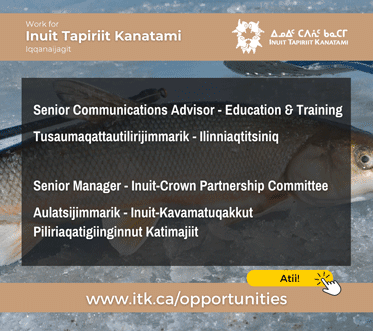Res-school deal set to close this fall
Courts: “Former students and family members have the right to object…”
Inuit survivors of residential schools — and the lawyers and organizations who represent them — will face one last hurdle this fall.
That’s when courts in nine provinces and territories will hold final hearings on a settlement agreement reached last year between the federal government, numerous churches, and lawyers representing residential school survivors.
The purpose of those hearings is to allow any former student, or family member of a former student, to tell the courts about any parts of the agreement that they don’t like.
“Former students and family members have the right to object to the agreement if they don’t like some part of it,” says a press release issued last week by the courts.
After that, courts will likely approve the deal, and notices will go out explaining how people may apply for compensation payments.
It’s estimated that at least 4,000 Inuit and Inuvialuit living in Nunavut, Nunavik, the Northwest Territories, and southern Canada are eligible for compensation payments.
You can find information about the settlement agreement on the internet here: www.residentialschoolsettlement.ca.
There, you’ll find numerous documents explaining the agreement in English, Inuktitut and French, as well as application forms for the $8,000 advance payment that’s now available to survivors aged 65 and older.
The site also contains forms that former students may use to ask questions or register objections.
In Nunavut, former students may register objections at a public hearing set for Oct. 10-11 at the Iqaluit courthouse, to be organized by the Nunavut Court of Justice in Iqaluit.
In Quebec, former students may attend a public hearing starting at 9:30 a.m. Sept. 8 at the Palais de Justice, 1 rue Notre-Dame est, to be organized by the Quebec Superior Court.
In the Northwest Territories, former students may attend a public hearing Oct.3-4, at the Yellowknife courthouse, 4903 49th St.
Information about hearings in other provinces is listed at the residential school website.
The settlement deal, reached last November, was confirmed this past April by Jim Prentice, the Tory DIAND minister.
That agreement, which is detailed on the website, provides for the following:
* a “common experience” payment for every aboriginal person who attended a residential school run by, or on behalf of, the federal government, comprising a lump sum of $10,000, plus $3,000 for each year of attendance;
* an “individual assessment process” to provide additional compensation to those who suffered severe physical or sexual abuse;
* $125 million to the Aboriginal Healing Fund, which will be used to pay for healing programs over a five-year period;
* $20 million to set up memorials to help people remember the history of residential schools;
* money to pay for a “truth and reconciliation” process that would bring people together in a public acknowledgement of what happened at aboriginal residential schools.
Under the “individual assessment process,” or IAP, former students who suffered serious physical or sexual abuse may apply for additional compensation payments, ranging in size from $5,000 up to $275,000 per student.
Under the IAP scheme, the size of the payment is calculated using a point system that measures the severity and frequency of the abuse claimed by the former student.
The federal government appointed Frank Iacobucci, a former Supreme Court justice, as its representative last year, after a national consortium of lawyers launched a class-action lawsuit on behalf of every aboriginal person in Canada who attended a residential school run by or for the federal government.
Known as the “Baxter case,” that lawsuit threatened to create a $16-$18 billion liability for the federal government.
The settlement, on the other hand, will likely cost about $2.2 billion, with about $1.9 billion set aside for compensation payments.
The following schools, all of which may have been attended by Inuit or Inuvialuit, are listed in schedules attached to the settlement agreement.
Manitoba
* Churchill Vocational Centre
(Attended by students from what is now Nunavut and Nunavik)
Northwest Territories
* Aklavik: Immaculate Conception
* Aklavik: All Saints
* Fort McPherson: Flemming Hall
* Inuvik: Grollier Hall
* Inuvik: Stringer Hall
* Yellowknife: Akaitcho Hall
* Shingle Point Eskimo Residential School
* Fort Smith: Grandin College
Nunavik
* Federal Hostels at Great Whale River (Kuujjuarapik)
* Federal Hostels at Port Harrison (Inukjuak)
* Federal Hostels at George River (Kangiqsualujjuaq)
* Federal Hostels at Payne Bay (Kangirsuk)
Nunavut
* Chesterfield Inlet: Joseph Bernier School, Turquetil Hall
* Coppermine Tent Hostel (Kugluktuk)
* Federal Hostels at Pangnirtung
* Federal Hostels at Broughton Island (Qikiqtarjuaq)
* Federal Hostels at Cape Dorset
* Federal Hostels at Eskimo Point (Arviat)
* Federal Hostels at Igloolik
* Federal Hostels at Baker Lake
* Federal Hostels at Pond Inlet
* Federal Hostels at Cambridge Bay
* Federal Hostels at Lake Harbour (Kimmirut)
* Federal Hostels at Belcher Islands (Sanikiluaq)
* Federal Hostels at Frobisher Bay (Ukkivik Hostel, Iqaluit)





(0) Comments